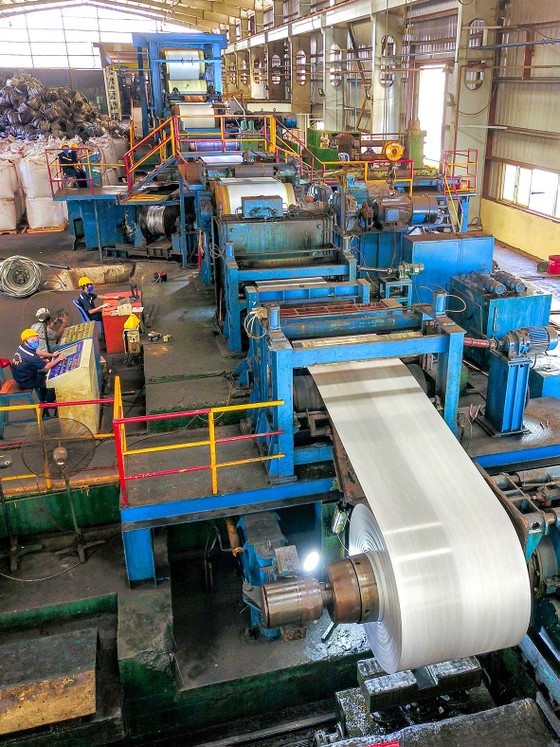
Former Chairman of the Vietnam Institute of Economics Tran Dinh Thien commented that the Covid-19 pandemic has been wreaking havoc on the global economy, including Vietnam. It has turned unipolar supply chains in the world to multipolar ones, bringing great opportunities to Vietnam, which is considered a ‘storm shelter’ of both foreign investment flows and global supply chains. By October this year, these flows have reached US$15.43 billion (a rise of over 16 percent compared to 2021).
Nevertheless, economic experts stated that only when Vietnamese companies can prove their capacity in attracting foreign capital flows will the national economy become sustainable, independent, active, and autonomous. This means domestic businesses should receive support for the three key fields of digital transformation – capital source – human resources.
As digital transformation is vital to the existence of an enterprises, functional agencies must introduce suitable legal corridors as well as quality criteria for digital transformation software, in hope of creating consistency with the current platforms of public administrative services. This consistency will then form compatibility and smoothness for the operations of a business.
“To undergo digital transformation without any risk, companies must be well-prepared as to human resources, software, operation methods. Meanwhile, functional agencies must upgrade the level of their employees correspondingly”, said Deputy General Director of Mebipha Co. Ltd. Lam Thuy Ai.
President Vu Hai Quan of Vietnam National University-Ho Chi Minh City said that there must be connection mechanisms among research institutes, universities, and businesses ordering human resources so that the training curricula are more practical, greatly improving the performance and saving training costs. In addition, localities and even the central state leaders should introduce a channel for labor suppliers and employers, divided into different job categories.
Vice Chairman of the Vietnam General Confederation of Labor Ngo Duy Hieu said that the human resources market is the leader to boost the improvement of other markets as well as the whole economy. Hence, completing corresponding policies about national administration of laborers and social security (social housing for workers, upgrading current rented houses for workers, social insurance, health insurance, unemployment insurance) is critical. Along with that must be the establishment of connections between employers – labor trainers both inside and outside the country.
Director Nguyen Dang Hai of the Authority of Science-Technology (under the Ministry of Science and Technology) stressed the necessity to synchronously carry out multiple measures for technology upgrade and digital transformation, the most noticeable of which are research boosting, technology transferring in Industry 4.0.
He also mentioned the need to develop specific institutions, mechanisms, policies to mobilize social resources for the above tasks so that the administrative capacity of the State to scientific-technological and innovative activities.
Financial aid disbursement to help needy businesses to resume their operations is also critical. Besides pouring capital for major technical infrastructure projects to be the leverage for economic growth, the State should diversify the loan sources for businesses. Therefore, Nguyen Ngoc Hoa from the HCMC Finance and Investment State-owned Company proposed a mobilization of social resources to increase the capital for manufacturing and innovative startup activities.
Suitable support policies for each manufacturing field are also mentioned so that businesses in those fields find it easier to exploit financial aids.
Another important factor to help domestic businesses grow is the mindset change from traditionally exporting raw materials to expanding international markets for end-products. To do this, businesses normally help raw material exploiters like farmers to actively implement advanced technologies to better control material quality, while these companies themselves register for intellectual property rights of their end-products and their brand names before introducing those products to the world.
One typical instance is Vinamilk JSC., which has stabilized its position in the demanding markets like the US, Europe, the Republic of Korea, China, or the Middle East via its ‘make-in-Vietnam’ brand names.
Dr. Nguyen Thanh Binh from the Banking Academy of Vietnam mentioned reports by Google and Temasek (Singapore), saying that the national digital economy could reach US$30 billion in 2025, and the national GDP could increase by $162 billion in 20 years as long as Vietnam successfully carries out its digital transformation process. Worryingly, 96 percent of domestic businesses are small and medium-scale. 76 percent of them are not ready for this important process since they are unable to find a suitable transformation model, neither can they find accompanying partners.
For the digital transformation process of enterprises become more efficient and sustainable, it is necessary to upgrade the awareness of their leaders, to actively invest in renovating current machinery and technologies corresponding to the national IT infrastructure and novel technology applications in Industry 4.0.
Obviously, a boost in human resources, capital, and the digital transformation process is able to help Vietnam take advantage of valuable opportunities to expand its global markets via FTAs while attracting foreign capital flows pouring excitingly into the country for the growth of small and medium-scale enterprises.
























